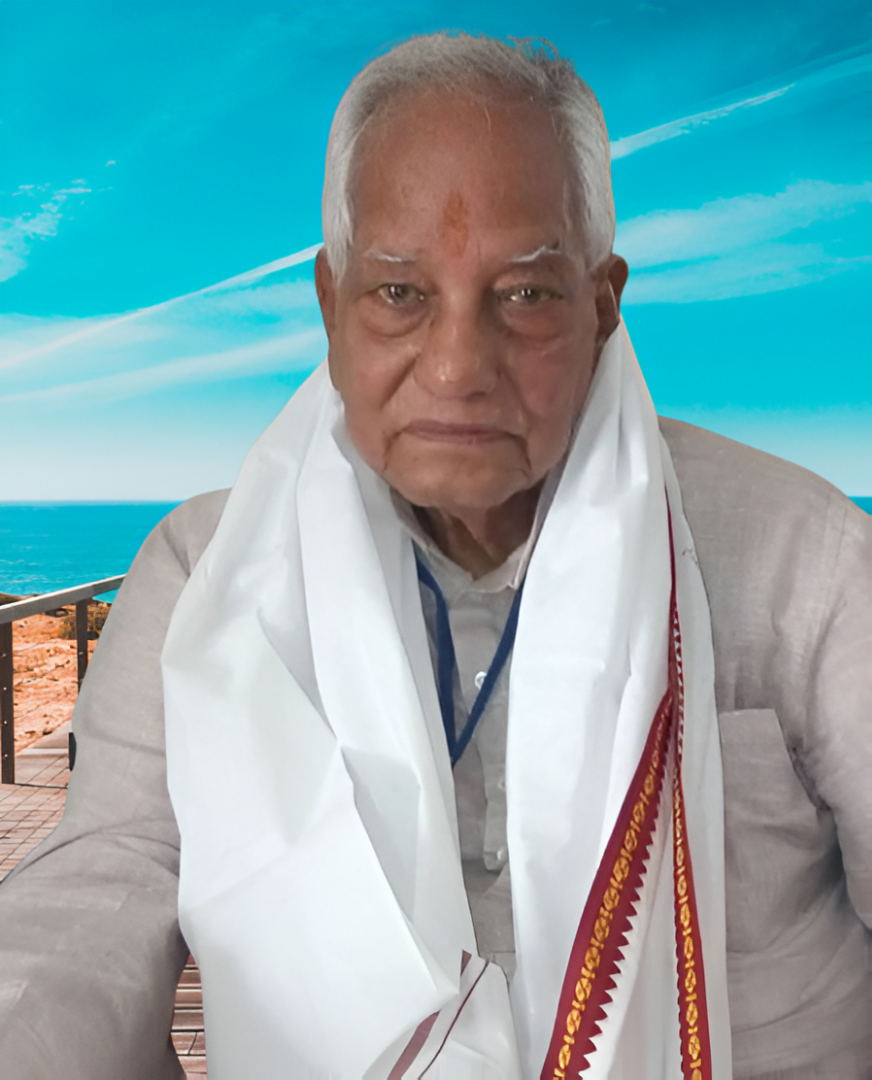(Late) Shri Sharda Prakash Johri ‘Mamaji’ — Biography
Early Life and the Story Behind His Name
Late Shri Sharda Prakash Johri, affectionately called “Mamaji” by everyone, was born on May 17, 1927, in a simple middle-class Kayastha family near Shahjahanpur, Uttar Pradesh. On the very day of his birth, water was released for the first time in the Sharda Canal—considered the lifeline of the state—marking a historic event. To commemorate this auspicious coincidence, his parents named him Sharda Prakash, a name that came to symbolize the meaning of his life—illumination and guiding light.
Family, Education, and Early Traits
He grew up with two elder sisters and a younger brother. His early education took place in the village itself. From childhood, he was highly disciplined, honest, and straightforward. Natural leadership, confidence, and firmness in conduct were evident in him from the beginning. His personality reflected a remarkable balance of inner strength and sensitivity, visible in both his external demeanor and inner nature.
Bearing Responsibilities at a Young Age
The family’s financial condition was modest. Understanding his family’s struggles, Mamaji started working at the tender age of 17. These early hardships instilled in him determination, humility, and industriousness. After several small jobs, he joined the Irrigation Department, where he handled accounting and financial responsibilities, serving in many districts. His decades-long government service was like a pure, transparent river—clean, flawless, and always flowing in the service of society.
Dedication and Administrative Ideals
His honesty, commitment, and transparency deeply impressed not only his colleagues but also his senior officers. For him, ethics remained paramount in every responsibility. Despite life’s many challenges, he always stood firm on his values. His simplicity and compassion became his identity.
Marriage and Social Courage
Even in personal decisions, Mamaji challenged social orthodoxy. On June 2, 1948, he married without dowry—at a time when dowry and caste prejudices were harsh social realities. Though he belonged to the Saxena branch of the Kayastha community, he married the late Smt. Vimla Srivastava of the Srivastava branch. This was a courageous social step, reported positively by many newspapers of that time.
Daughters — His Pride and Strength
God blessed him with five daughters, whom he lovingly called his five jewels. At a time when daughters were considered a burden, Mamaji celebrated their birth with pride. On the birth of his eldest daughter, he distributed 41 kilograms of sweets, striking a strong blow to societal stereotypes. He prioritized their higher education under all circumstances and proudly declared: “My daughters are my strength.” His outlook inspired future generations to respect and empower daughters.
Post-Retirement Social Life
After serving in government service until the age of 58, he retired from Shahjahanpur. This marked the beginning of his second innings—his dedicated social life. Post-retirement, he joined Sarvodaya Ashram with his eldest daughter and nephew (late Shri Ramesh Bhai), offering his full-time service. As Ramesh Bhai addressed him as “Mamaji,” soon everyone—from workers, Sarvodayis, and even school children—began calling him “Mamaji,” and he became beloved as Jagat Mama.
Before fully associating with Sarvodaya Ashram, he also visited “Brahmavidya Mandir, Paunar” and received blessings from Saint Vinoba Bhave, committing himself entirely to social service. His sense of responsibility was clear in his words: “Now I must not work for money, but for society.”
Revolutionary Work in Health
As an expert in accounting, he wrote the financial and human resource manual for the institution. Choosing community health as his mission, he trained uneducated rural women as primary health workers. These women provided services in remote areas inaccessible to doctors. He spread awareness among women about sanitation, first aid, and nutrition. His village campaigns not only built women’s confidence but also changed the rural perspective on health, expanding his reputation far and wide.
Distinct Contributions
He remained a lifelong member of the governing body of Sarvodaya Ashram and served for years on its executive committee. He also served as the provincial president of the Harijan Sevak Sangh, and was actively associated with Bhartiya Rachnatmak Samaj and UPVHA.
Notable contributions included:
- “Sure Start” project for maternal and child health
- Child Rights Project (JICA-supported)
- Forest Department initiatives in Lakhimpur
- World Bank-assisted Usar Reclamation Project in 25 districts of Western Uttar Pradesh
He not only strengthened health-related programs but also contributed to other institutional initiatives. At a critical time, when President (late Shri Ramesh Bhai) and Secretary (Ms. Kusum Johri) could not manage the institution’s affairs for two years, Mamaji single-handedly led all programs smoothly. This reflected his leadership, determination, and foresight.
Whenever financial crises arose, he prioritized the institution over personal interests, always extending support.
Silent Philanthropy
Mamaji was not only active through institutions but also personally helped countless individuals—always discreetly, never speaking of his contributions. Over time, he also became involved with Kayastha community initiatives, extending financial aid to their social causes. Like a saint, he quietly served others selflessly. His purity, affection, and generosity placed him on par with a true Mahatma.
Love for Travel
Alongside social work, Mamaji had a deep interest in travel. Work commitments and seminars took him across India, while personal trips took him abroad with his youngest daughter—to countries like the USA, UK, Trinidad & Tobago, Jamaica, Bhutan, Nepal, and more.
Legacy of His Personality
Mamaji’s life was a shining example of ideals, ethics, and service. Though principled and firm, he had a tender heart. He shared in the joys and sorrows of everyone. In times of crisis, people instinctively turned to him for support. He was not only a guardian for his family but for the entire community.
Conclusion
The life of Late Shri Sharda Prakash Johri ‘Mamaji’ was like a calm, deeply flowing river—carrying service, dedication, and compassion in its current. Through his deeds, love, and ideals, he illuminated not only his family but society at large. His values, principles, and work continue to live on in the activities and culture of Sarvodaya Ashram. He remains not just a memory but a living inspiration—for all those who truly wish to bring about change in society.

